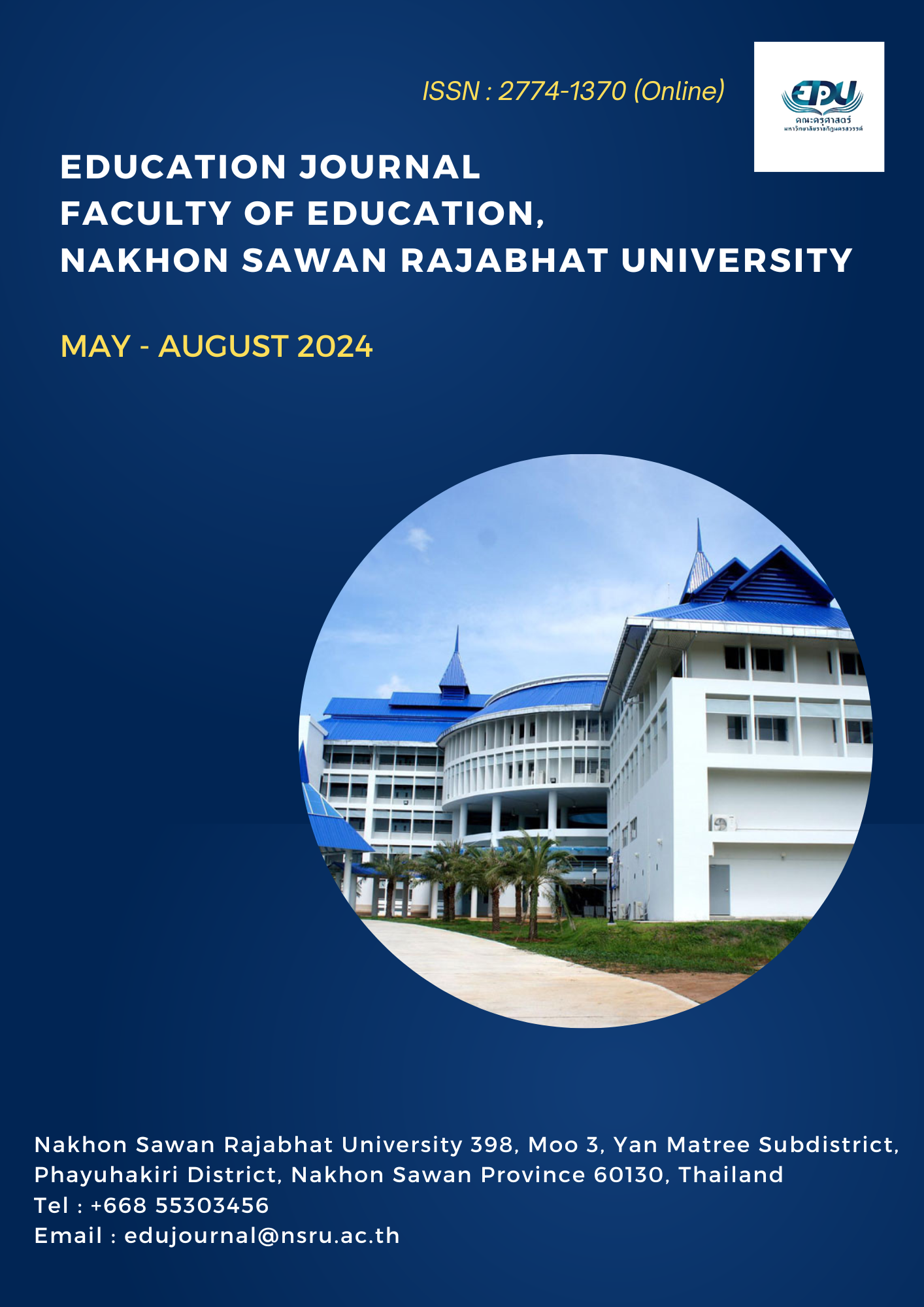Comparison of Learning Achievement and Learning Attitude for Computer Application Fundamentals Course between using Task-Based Learning and Traditional Learning in Guangxi Minzu Normal University, China
Main Article Content
Abstract
The purposes of this study were: 1) to compare learning to learning achievement under task-based learning and traditional learning activities, 2) to investigate students' attitudes towards computer learning after task-based learning. The samples of this research came from 30 students in Class 1 and 32 students in Class 2 of Mathematics Education major in Guangxi Minzu Normal University in the 2023 academic year. Class 1 used task-based learning and Class 2 used traditional learning. The instruments were 1) 4 task-based learning and 4 traditional learning lesson plans. Likert scale was used to evaluate, the index of task-based learning projects was between 4.38-5.00, and the index of traditional learning projects was between 4.24-5.00, 2) learning achievement test paper, the item-objective congruence (IOC) value of each item in the test paper evaluation form was between 0.80– 1.00, and the difficulty (p) of the test paper was between 0.37-0.83, the discrimination (r) of the test paper was between 0.22-0.56. 3) learning attitude questionnaire, which the item-objective congruence (IOC) was between 0.60-1.00, the reliability of the questionnaire was 0.93, and the validity of the questionnaire was 0.70. Data analysis was performed by percentage, mean, standard deviation, and t-test. The results of this research were as follows:
1) The learning achievement of task-based learning was significantly higher than that of traditional learning at the .05 level. 2) The learning attitude of the task-based learning was significantly higher than that of the traditional learning at the .05 statistical level.
Downloads
Article Details

This work is licensed under a Creative Commons Attribution-NonCommercial-NoDerivatives 4.0 International License.
References
Dai, W. M. (2016). Problems and Teaching Reform of Computer Application Basic Teaching in Colleges and Universities. Journal of HUBEI Correspondence University. (29): 107–108.
Ellis, R. (2003). Task-based language learning and teaching. New York: Oxford university press.
Fan, R. F. (2017). The Design and Practice Research Based on the Task-driven Method in Computer Teaching at Secondary Vocational School — Take “the Basic Application of Computer” at Secondary Vocational School as an Example. Master Dissertation. Hebei Normal University.
Genesee, F., Kathryn Lindholm-Leary, Christian, D., Saunders, W., & Saunders, B. (2006). Educating English language learners: A synthesis of research evidence. Cambridge: Cambridge University Press.
Good, C. V., & Merkel, W. R. (1973). Dictionary of education. New York: McGraw-Hill.
Greenwald, A. R. P. S. J. B. A. G. (2014). Attitude structure and function. New York: Psychology Press.
Han, J. (2020). Research on the application of task-driven teaching method in the teaching of Information Technology in secondary vocational schools —— Taking the teaching of Computer Application Foundation as an example. Master Dissertation. Shanxi University.
Liu, H. H., & Su, Y. S. (2018). Effects of using task-driven classroom teaching on students’ learning attitudes and learning effectiveness in an information technology course. Sustainability (Switzerland). 10(11): 3957. from https://doi.org/10.3390/su10113957.
Luo, M. L. (2018). The Development of Communicative Ability and Attitude toward Chinese Language of Secondary School’s Students 5 Based on Task-based Language Teaching. Master Dissertation. Mahasarakham University.
Ministry of Education, P. R. of C. (2012). Notice of the Ministry of Education on Printing and Distributing the “Ten-Year Development Plan for Education Informatization (2011-2020).” Retrieved on August 15, 2022, from http://www.moe.gov.cn/srcsite/A16/s3342/201203/ t20120313_133322.html.
Musengimana, J., Kampire, E., & Ntawiha, P. (2022). Effect of task-based learning on students’ understanding of chemical reactions among selected Rwandan lower secondary school students. Journal of Baltic Science Education. 21(1): 140-155. From https://doi.org/10.33225/jbse/22.21.140.
Nunan, D. (1989). Designing tasks for the communicative classroom. Cambridge: Cambridge university press.
Tian, L. Q. (2018). Research on the problems and teaching reform measures in the basic teaching of computer application in colleges and universities. Modern Vocational Education. (02): 76.
Wegener, D. T., & Gregg, A. P. (2000). Attitudes: Attitude structure. In A. E. Kazdin (Ed.), Encyclopedia of Psychology. (1): 305–309. Oxford University Press.
Willis, J. (1996). A flexible framework for task-based learning. Challenge and Change in Language Teaching. 52: 62.
Willis, J., & Willis, D. (2013). Doing task-based teaching-Oxford handbooks for language teachers. Wellington: Oxford University Press.
Wiriyakarun, P. (2001). Students’ Reactions to Task-based Learning. Journal of rEFLections. (3): 1–7.


